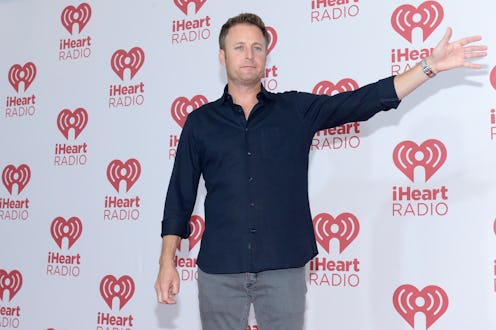For those of you who keep on ear to the ground waiting for any news on your favorite pageant competition, the revelation that Chris Harrison will host Miss America once again is incredibly exciting. While I'm thrilled that he'll get the opportunity for the eighth — that's right, eighth — time, there is one thing I'm slightly concerned about. Despite his eight year tenure hosting Miss America, Harrison is, of course, best known for hosting The Bachelor and The Bachelorette. The most recent season of The Bachelor starring Ben Higgins ended happily, with his engagement, but it also brought about an event that raised some red flags for me. It may have been a fluke or a one-off, but I still think it's worth discussing as a lesson for Harrison on what not to do when he returns as the Miss America host on Sep. 11.
Earlier this year, at The Bachelor: Women Tell All, all the women were brought back to talk about their experiences, as always, and one person who Harrison singled out for a more personal interview was Jubilee Sharpe. The 25-year-old had been eliminated from the competition in Week 5, but made a real impression on me as an intelligent, independent woman who had her life together and knew her own deal. She didn't take any flack from other contestants, and, honestly, having her on the show was a breath of fresh air. But, unfortunately, when it came time for her interview, it didn't feel to me like Harrison felt the same way.
As Sharpe discussed the trauma of her childhood — she lost literally her entire family — and clarified some contentious comments she'd made about being a black woman in the house that rubbed some people the wrong way, it felt almost as if she was being asked to apologize. And not for something she'd done, or a way she'd made someone feel, but for who she was as a person. Sharpe attempted to lighten the mood a bit by poking fun at the way the show encourages big reveals in romantic moments by describing one of their interactions as her saying, "Hey Ben, my whole family died. Let's make out," and then got a little more serious, clarifying, "Ben was everything that I thought he was. You know, he didn't see me and my complicated past as a huge obstacle."
And I wish we could've left it right there, marveling at Sharpe's self-awareness and willingness to be vulnerable in front of both Higgins and America, but we didn't. Instead of celebrating all the things about Sharpe that make her wonderful and strong and inspiring, here's how Harrison responded: "I know you can't control how complicated you are. You might be complicated, and I know you stir the pot sometimes, but I hope you realize you're a pretty special woman, and I really appreciate you coming here and opening up the way you did."
A lot of that sounds pretty positive on the surface, but the use of the word "complicated" in that context did snag a little in my brain. Saying you can't control how complicated you are suggests that you should, and then in turn implies that there's something wrong with being complicated. I really don't think that's the case at all. And I'm not the only one — Amy Schumer also called out Harrison on his choice of words, saying in a series of tweets:
There is nothing wrong with "complicated" women Chris Harrison. You treated it like something she should fight. A women [sic] shouldn't try to be less complicated so as to hopefully attract a man. And she shouldn't find value in herself just because a dude liked her. Come on bro. She is smart and strong and a sergeant in the military. She lost her entire family and you say she must fight off being complicated.
To his credit, Harrison responded, saying he endorsed all those qualities about Sharpe as well and that he didn't mean to cause a problem. He even made plans to talk about the incident with Schumer over a glass of wine, though I have no idea if that hangout actually took place.
It's just the kind of thing that concerns me going into Harrison's latest year ushering a group of young women through a televised competition. He's a seasoned veteran when it comes to both Miss America and The Bachelor, but this interaction with Sharpe proves that even a veteran can make mistakes or say something that comes across poorly to the audience, even with the best of intentions. Just like the contestants on The Bachelor, the women of Miss America are under an intense amount of pressure to succeed on a national stage. Miss America, like The Bachelor, should ideally be about embracing who these women are, in all their layered, compelling, complicated glory.
I have my fingers crossed that Harrison has learned from that little Bachelor slip-up, and is ready and eager to spend another year celebrating the women of Miss America for exactly who they are.
